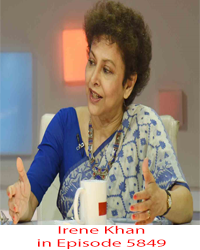Irene Khan

| UN Special Rapporteur |
| Human Rights Activist |
Full Name: Irene Zubaida Khan
Affiliation: United Nations
Current Position: Special Rapporteur on the promotion and protection of freedom of opinion and expression
Date of Birth: December 24, 1956
Place of Birth: Bangladesh
Home District: Sylhet
Nationality: Bangladeshi
Profile:
Irene Zubaida Khan (born 24 December 1956) is a Bangladeshi lawyer appointed as of August 2020 to be the United Nations Special Rapporteur for freedom of expression and opinion, the first woman appointed to this mandate. She previously served as the seventh Secretary General of Amnesty International (from 2001 to 2009). In 2011, she was elected Director-General of the International Development Law Organization (IDLO) in Rome, an intergovernmental organization that works to promote the rule of law and sustainable development. She was a consulting editor of The Daily Star in Bangladesh from 2010 to 2011.
Khan was born in Dhaka, though her ancestral home is in Birahimpur, Sylhet. She is the daughter of Sikander Ali Khan. Khan grew up in a wealthy family. During her childhood, East Pakistan became the independent nation of Bangladesh in 1971 following the Bangladesh Liberation War. Human rights abuses that occurred during the war helped shape the teenage Khan's activist viewpoint. She left Bangladesh as a teenager for St. Louis Grammar school in Kikeel, Northern Ireland 1973–1975. Khan went to England, where she studied law at the University of Manchester and then, in the United States, at Harvard Law School. She specialized in public international law and human rights.
Khan began her professional career with the UN High Commissioner for Refugees, working for 21 years at headquarters and in various country operations, including Chief of Mission in India and Deputy Director, Division of International Protection.
Irene Khan is the UN Special Rapporteur on the promotion and protection of the right to freedom of opinion and expression since 1 August 2020. She is the first woman to hold this position since the establishment of the mandate in 1993. She is an internationally recognized advocate for human rights, gender equality and social justice. She teaches at the Graduate Institute of International and Development Studies in Geneva, and is co-author of The Unheard Truth: Poverty and Human Rights, which has been published in seven languages.
Khan was Secretary General of Amnesty International from 2001 to 2009. Under her leadership, Amnesty strengthened its work on political and civil rights, especially in the context of counter-terrorism and armed conflicts, while also expanding its mandate to include economic, social and cultural rights. The first woman to head Amnesty International, she launched its first global campaign to stop violence against women and girls.
From 2012 to 2019, Khan headed the International Development Law Organization (IDLO), the only intergovernmental organization exclusively devoted to the rule of law and sustainable development. In that capacity she co-convened the UN Conference in Preparation of the Review of SDG 16 in 2019, the High Level Group on Justice for Women in 2018 and the Conference on Rule of Law in Africa in 2016. She expanded programs on access to justice and championed Sustainable Development Goal 16 on peace, justice, access to information and effective institutions.
As Consulting Editor of The Daily Star in Bangladesh from 2010 to 2011, Khan covered human rights, democracy and gender issues and supported independent media. She was Visiting Professor at the State University of New York Law School in 2011 and Chancellor of Salford University in the UK from 2009 to 2015.
Khan collaborates with the Columbia Global Freedom of Expression program, including as a member of the Jury of the Global Freedom of Expression Awards. She was a member of the World Bank Gender Advisory Council, the UNAIDS High Level Panel on HIV Prevention and Human Rights, and the UN Global Compact Advisory Council. She sits on the governing boards of the Overseas Development Institute (UK), BRAC (Bangladesh) and Barefoot Law (Uganda).
Khan has received several awards, including the Ford Foundation Fellowship, the Pilkington Woman of the Year Award (2002) and the Sydney Peace Prize (2006). In 2006 the University of Ghent awarded him an institutional honorary doctorate. He is one of the two nominees for the new Chancellor of the University of Manchester. He was appointed Vice-Chancellor of Salford University in July 2009.
Register for comment









